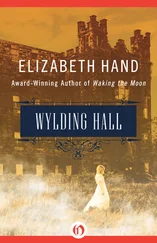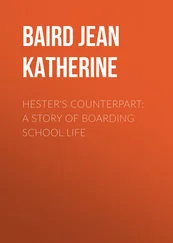Jean Baird - Elizabeth Hobart at Exeter Hall
Здесь есть возможность читать онлайн «Jean Baird - Elizabeth Hobart at Exeter Hall» — ознакомительный отрывок электронной книги совершенно бесплатно, а после прочтения отрывка купить полную версию. В некоторых случаях можно слушать аудио, скачать через торрент в формате fb2 и присутствует краткое содержание. Жанр: foreign_antique, foreign_prose, на английском языке. Описание произведения, (предисловие) а так же отзывы посетителей доступны на портале библиотеки ЛибКат.
- Название:Elizabeth Hobart at Exeter Hall
- Автор:
- Жанр:
- Год:неизвестен
- ISBN:нет данных
- Рейтинг книги:3 / 5. Голосов: 1
-
Избранное:Добавить в избранное
- Отзывы:
-
Ваша оценка:
- 60
- 1
- 2
- 3
- 4
- 5
Elizabeth Hobart at Exeter Hall: краткое содержание, описание и аннотация
Предлагаем к чтению аннотацию, описание, краткое содержание или предисловие (зависит от того, что написал сам автор книги «Elizabeth Hobart at Exeter Hall»). Если вы не нашли необходимую информацию о книге — напишите в комментариях, мы постараемся отыскать её.
Elizabeth Hobart at Exeter Hall — читать онлайн ознакомительный отрывок
Ниже представлен текст книги, разбитый по страницам. Система сохранения места последней прочитанной страницы, позволяет с удобством читать онлайн бесплатно книгу «Elizabeth Hobart at Exeter Hall», без необходимости каждый раз заново искать на чём Вы остановились. Поставьте закладку, и сможете в любой момент перейти на страницу, на которой закончили чтение.
Интервал:
Закладка:
She ran down-stairs. Her father and mother stood at the foot looking pleased.
“I know she will be glad,” her mother said.
“Of course she will,” replied her father.
She paused on the stairway in wonder. She was very good to look at as she stood so. Her soft hair was drawn loosely back from her face, and hung in a long, fair plait down her back. She was not beautiful, only wholesome looking, with a clear, healthy color, and large, honest eyes. Her dress was a simple, inexpensive shirtwaist suit, but every article about her was in order. There was no sagging of belts, or loose hooks.
Her father held out a book as she came toward them. He was brimming over with joy at the prospect of her delight.
“It is a catalog of Exeter Hall, Elizabeth. That is the school Miss Hale attended. I’ve looked over dozens of catalogs and this pleases your mother and me best. We want you to go in the fall.”
“Oh!” was all she said then, but it was expressive enough to satisfy her parents. She had read stories of schoolgirl life which seemed more like fairy stories than experiences of real girls.
“Look it all over, Elizabeth. The course of study is mapped out. We think the classical course suited to you. Your mother and I are going to drive down to the mines. Study the catalog while we are gone and be ready to tell us what you think of it when we come back.”
She needed no second bidding to do this. By the close of the afternoon, she had read and re-read the prospectus. She became so excited she could scarcely sit still. There was one matter which did not fully satisfy her. She had advanced beyond the course at Exeter in some branches and smiled as she read the amount of work laid out in botany for the Middle Class. She had far exceeded that, for she had found and mounted every specimen of plant and flower that grew for miles around Bitumen.
The cost of a year’s schooling was a surprise. Her father and Miss Hale could teach her everything that the course at Exeter included. It seemed foolish to spend so much money when all could be learned at home.
That evening Miss Hale drove over to see how Elizabeth was pleased with the prospect of going away to school. The matter was discussed from all points of view. Then Elizabeth expressed the thought which had come to her while studying the catalog:
“But I have had more work than the Freshman and Middle Classes require. It would not take me long to complete the work for the Senior year. I want to go, – I think I have always wanted to go to school, but it seems such a waste of money. You can teach me more, I can really learn as much at home.”
Her father laughed, “Impossible! The girls at Exeter will teach you more in one term than I can in a year. I do not expect you to be a Senior. I shall be more than satisfied with your entering as a ‘Middler.’ You’ll need plenty of time for extras.”
“Extras? What extras must I take?”
“Chafing-dish cooking and fudge making,” replied Miss Hale, promptly. “It will take a full term for you to find your place among young people, and learn all they will teach you.”
“But they will know no more than I do,” said Elizabeth.
“Perhaps not so much; but what they know will bear no relation to what they teach you. I’m willing to promise that you will learn more from your roommate than you do from any instructor there.”
Elizabeth glanced from one to the other. She failed to understand.
“We will have no more lessons after to-morrow,” said Mrs. Hobart. “Elizabeth and I will begin putting her clothes in order. There will be a great deal to do, for she will need so much more at school than she does at home. We do not wish to hurry.”
“Only eight weeks yet,” said Elizabeth, “I wish I was going next week.”
The day following the work on the outfit for school began. “Plain and simple,” her mother declared it should be. But Elizabeth fairly held her breath as she viewed the beautiful articles laid out to be made.
“This pale blue organdie will do for receptions and any public entertainments you have,” her mother explained. “Every girl at school needs some kind of a simple evening dress. You’ll need a cloth suit for church and shopping. Then, of course, the school dresses.”
Every morning Elizabeth on her way down-stairs to breakfast slipped into the sewing room to view the new dresses. She had never so much as thought, not to say expected, to own a rain coat and bath robe, and a soft eider-down sacque. But there they lay before her. Their existence could not be questioned.
“Do you think the other girls at Exeter will have so much?” she asked of Miss Hale. “I don’t want to look as though I was trying to out-dress anyone.”
“If you find they have less than you, keep some of your good things in your trunk. You do not need to wear them all,” was Miss Hale’s advice. “No doubt they are fixing themselves up, too,” she added.
Elizabeth had never thought of the matter before. Now the mere thinking about it seemed to bring her into relation and sympathy with those hundreds of unknown girls who were, like her, counting each penny in order to spend it to the best advantage, all the while looking forward to the first of September.
It came at last. The big trunk was brought down from the attic. The new dresses were folded and packed. The books which she might need at Exeter were put into a box. The trunk was locked and carried into the lower hall, waiting for the drayman to call for it early the following morning.
At this juncture going away from home changed color. It was no longer something to look forward to with pleasure, but something to dread. Elizabeth was not the only one who felt the coming separation. She noticed through a film of tears that the best linen and china were used, and that her favorite dishes had been prepared for the last home supper.
Despite their feelings, each made an effort to be cheerful. Mr. Hobart told incidents of his own school-days, and rallied Elizabeth on being homesick before she had started.
Afterward, they sat together on the porch. The father and mother talked but Elizabeth sat silent. She was thinking that the next evening would find her far away and among strangers. She dreaded meeting girls who had been reared with others of their age, and who had been in school before, feeling that she would appear very awkward and dull until she learned the ways of school. She half wished that her father would tell her she need not go. She came closer and seating herself on the step below him, rested her head on his knee. “Father, I do not wish to go to Exeter. May I stay home with you and mother? Be a good daddy and say ‘yes.’”
“I shall be good and say ‘no.’ Our little girl must go away to-morrow. I can’t tell you how lonely we shall be, but we have had you so long that we were almost forgetting that you had a life of your own. We must not be selfish, so we send you off, bag and baggage.” Her mother added: “Unless she oversleeps, which I am sure she will unless she goes to bed right away. It is later than I supposed. Come, Elizabeth.”
As she spoke, Joe Ratowsky came across the lawn. In the moonlight, he looked like a great tawny giant. He spoke in English: “Mr. Hobart, that beeznez is no good. He no stay to-morrow. To-day homes he goes quick.”
“Where is his home? Doesn’t he live here?”
“Dennis O’Day, b’gosh, niver. So many as one children he have. Milton, he live.”
“Why doesn’t he bring his family here? I didn’t know the man was married.”
“Umh – yes, b’gosh. His girl tall like your girl. He no bring her. He proud like the tivil. Never he tell his girl what he do here – no, b’gosh, he don’t.”
“Well, come in and I will talk the matter over. We can’t do much else than wait.” Then turning to his daughter, “Good-night, Elizabeth, I must talk to Joe now.”
Читать дальшеИнтервал:
Закладка:
Похожие книги на «Elizabeth Hobart at Exeter Hall»
Представляем Вашему вниманию похожие книги на «Elizabeth Hobart at Exeter Hall» списком для выбора. Мы отобрали схожую по названию и смыслу литературу в надежде предоставить читателям больше вариантов отыскать новые, интересные, ещё непрочитанные произведения.
Обсуждение, отзывы о книге «Elizabeth Hobart at Exeter Hall» и просто собственные мнения читателей. Оставьте ваши комментарии, напишите, что Вы думаете о произведении, его смысле или главных героях. Укажите что конкретно понравилось, а что нет, и почему Вы так считаете.












